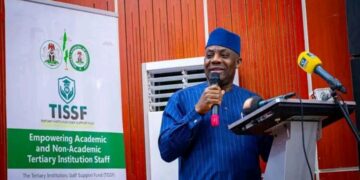![]()
In a recent interview, Chief Olabode George, former Deputy National Chairman of the People’s Democratic Party (PDP), expressed deep concern over Nigeria’s ongoing political and governance challenges.
He attributed these issues to entrenched tribalism, religious bigotry, and a fundamentally flawed democratic system.
Reflecting on the nation’s abundant resources, George lamented the pervasive influence of greed and self-interest. “God gave us a massive land, rich in both natural and human resources. There is no part of this country that isn’t blessed. Yet, greed and self-interest continue to plague us,” he remarked.
He criticized the political elite for neglecting effective governance, thereby allowing corruption and inefficiency to thrive. Drawing comparisons, George noted, “Other nations envy what we have, but we waste it. Look at Ghana; during their elections, the sitting president conceded before the final results. No manipulations, no drama. Here, we introduce a new system, and suddenly, there’s a glitch. It’s disgraceful.”
Highlighting the detrimental effects of tribalism and religious bigotry, George questioned their relevance to national unity and governance. He shared a personal anecdote: “People make a big deal out of religious differences, ‘Oh, this one is a Muslim,’ or ‘That one is a Christian.’ But what does that have to do with the price of milk?” He continued, “My older sister married a Muslim and became an Alhaja. She remained my sister till the end. So, I ask, what do religious labels have to do with how we treat one another?”
George argued that these divisions are often exploited by politicians for personal gain. “The British left us two devils: tribalism and religious bigotry. But tell me, what does religion have to do with governance?” he questioned.
Critiquing Nigeria’s political structure, George declared the current system as fundamentally flawed. “It has failed, absolutely. The current constitution is the root of our problems. Every month, states go to Abuja to collect their share of national revenue instead of generating their own. That’s not democracy; it’s a unitary system disguised as federalism,” he asserted.
He advocated for a return to the six-zone structure proposed by former Vice President Alex Ekwueme, suggesting it would provide a more equitable distribution of power. “When one region hoards all the power, resentment builds. That’s exactly what happened to my party. The presidential candidate, national chairman, and other key positions all came from the same region. That was a fundamental mistake,” he explained.
Emphasizing the urgency of meaningful restructuring, George warned, “Not just any restructuring, but a real, practical one. If we continue on this path, we are only postponing disaster.”
He highlighted the economic hardships faced by Nigerians, pointing to rising fuel prices and their impact on businesses. “People are suffering. The price of fuel is crippling businesses, yet those who control the banking sector are making billions. If the president truly cares about the people, he should work with the financial sector to stabilize fuel prices,” he urged.
Addressing the challenges of youth unemployment and the decline of vocational training centers, George noted, “We had trade centers where people learned carpentry, tailoring, and hairdressing. Now, nothing. That’s why we have a Yahoo Yahoo epidemic, because the system has failed young people.”
He issued a stern warning to political leaders: “Nothing lasts forever. Power is temporary. If you are in leadership, use the opportunity to serve, not to loot. A land of plenty should not have starving citizens. If we don’t change course, history will not be kind to us.”

























